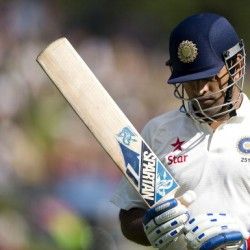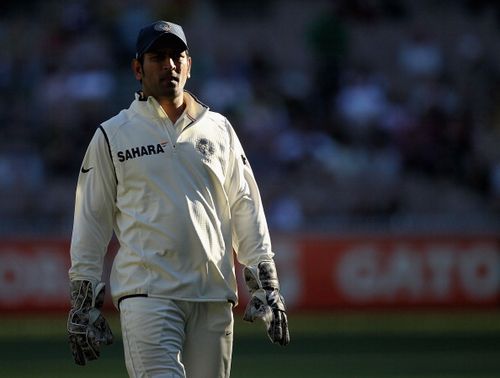
Time for a change of captain in Indian cricket?

Midas touch gone missing
India have now gone 3 years and 14 Tests without an overseas victory, with their last win coming against West Indies in Jamaica in June 2011. That streak might continue for the foreseeable future with difficult tours of England and Australia coming up later in the year. MS Dhoni has overseen this unsuccessful period as the captain, and I think it has now reached a stage where his position as captain of the Test side has almost become untenable.
His overseas record as captain in Test matches stands at 5 wins, 11 losses and 7 draws. No captain in the history of Indian cricket has suffered as many losses as Dhoni has, away from home, and this has come in a period when the unwanted tag of ‘Tigers at home, lambs abroad’ had been gotten rid of, after reasonable success overseas, both individually and collectively in the 2000s.
The main criticism of Dhoni’s captaincy has been his tendency to go on the defensive too quickly in Test cricket. No one disputes the fact that Dhoni is handicapped due to a relatively weak bowling attack in overseas conditions, but Dhoni shoots himself in the foot more often than not with his instinct to contain runs rather than be on the lookout for wickets. It is exemplified by Dhoni’s preference for the economical but largely non-threatening Ishant Sharma in the playing XI as compared to a more attacking option in Umesh Yadav.
Taking 20 wickets is imperative in order to win a Test match, and Dhoni, by now, should know that more than most. Saving boundaries seems to be higher on his priority list as supposed to taking wickets, and that has been his undoing in the longest format. The bowling, although largely weak and unreliable, has played its part overseas on a few occasions by putting the team in a good position, but Dhoni has failed to capitalize on those positions as a result of his defensive tactics.
The 2nd Test against England at Trent Bridge in 2011 illustrates my point. India had won the toss and chose to bowl on a helpful surface and made full use of the friendly conditions on offer. The bowlers succeeded by restricting England to 124/8 at one point, but Dhoni threw away the advantage by retreating to defensive fields as soon as two lower order batsmen, Stuart Broad and Graeme Swann, showed the slightest hint of waging a counter-attack.
As a result, England ended up posting a healthy total of 221 and won the match comprehensively in the end. Dhoni has resorted to defensive fields and tactics time and again when he, instead, should be attacking; the Test matches in Melbourne and Durban come to mind. There was hope that Dhoni might change his approach on seeing the recent success Australia have enjoyed as a result of Michael Clarke’s attacking tactics, but it seems to have had no effect.
The time for a captain who will bring a more attacking outlook on the game has probably come. Dhoni’s stubbornness to change his methods despite repeated failures has left the selectors with little option but to look elsewhere.